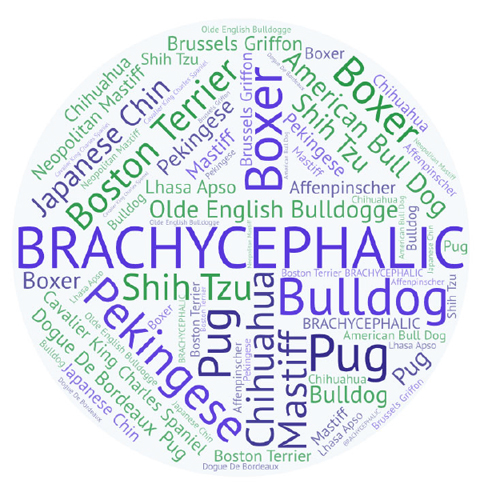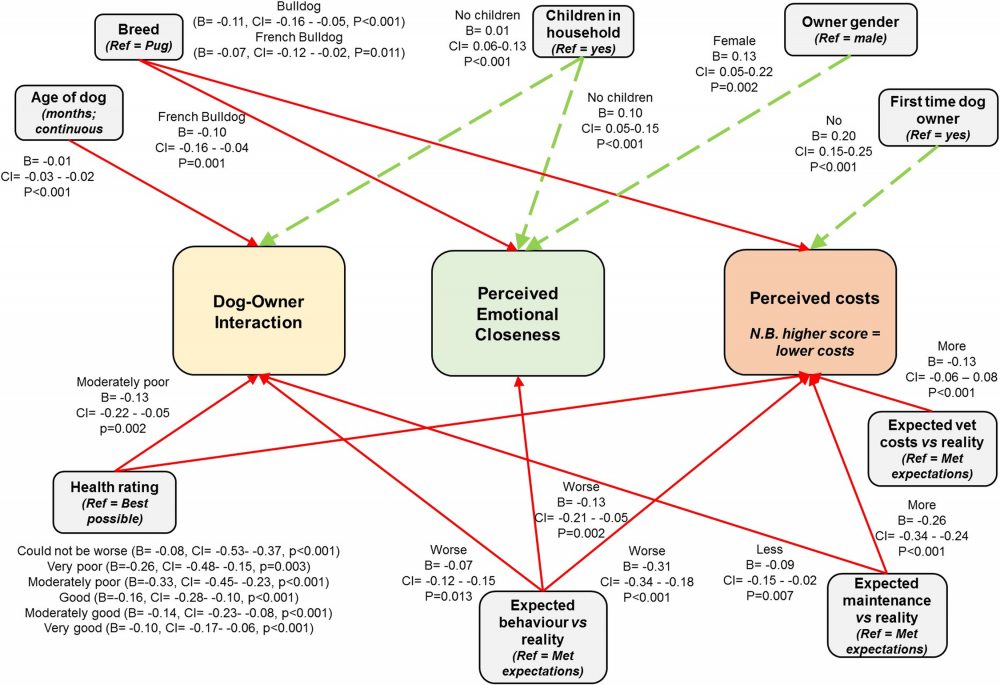This page lists resources and references that pertain to management of brachycephalic breed's health and welfare.
The links below represent International and National Approaches to Brachycephalic Breed Health Reforms in Dogs. Included are: links to Current Research, Veterinary organization's policies/whitepapers, Seminars / Workshops / Veterinary Congress presentations, Campaigns and more.
This article is for Veterinarians and anyone interested in the short faced breed's health and welfare.
We'd like to call your attention to a book and a Blog.
Edited By Rowena Packer, Dan O'Neill, Copyright Year 2021.
See Dr. Brenda Bonnett's Blog for comments on the recently published book.
Dr. Bonnett's Blog references a number of existing research papers, veterinary practice analyses, pet insurance claims, and ongoing measures, initiatives and responses to address the longstanding concerns over brachycephalic health. The Book's chapters provide insight. Check out the content below for the Book's Table of Contents, contributing authors and for a sense of the scope of the issues historically and today.
References & Resources List - Brachycephalic Dogs
 "Popularity of brachycephalic (flat-faced) dog breeds is increasing internationally despite well-documented intrinsic health and welfare problems associated with their conformation. Given this apparent paradox, greater understanding of the expectations and reality for brachycephalic dog owners and factors driving the dog-owner bond are needed. This study reports a large-scale online survey with ..."
"Popularity of brachycephalic (flat-faced) dog breeds is increasing internationally despite well-documented intrinsic health and welfare problems associated with their conformation. Given this apparent paradox, greater understanding of the expectations and reality for brachycephalic dog owners and factors driving the dog-owner bond are needed. This study reports a large-scale online survey with ..."
BLOG
...is the latest analysis of data collected and reported on in a 2019 study - see - Great expectations, inconvenient truths, and the paradoxes of the dog-owner relationship for owners of brachycephalic dogs.
FECAVA
"3 POSITION PAPER BREEDING HEALTHY DOGS: THE EFFECT OF SELECTIVE BREEDING ON THE HEALTH AND WELFARE OF DOGS. The impact of genetic disorders 1 and the breeding of dogs 2 with excessive traits on the health and welfare of dogs has increasingly come into the spotlight over recent years."
BREEDING FOR EXTREME CONFORMATIONS What is the problem? Extreme conformation of pets by selecting for a particular ‘look’ (e.g. flat nose, sloping back...
Urgent action on brachycephalic dogs called for during panel discussion at FECAVA/WSAVA/DSAVA Congress in Copenhagen
Raise awareness among dog owners and advise them about health and welfare issues in dogs with extreme conformations. 3. Raise awareness among breeders, breed clubs and show judges and advise them as to health and welfare issues in dogs with extreme conformations.
AVMA
STUDIES
"Brachycephalic dog breeds are regularly asserted as being less healthy than non-brachycephalic breeds. Using primary-care veterinary clinical data, this study aimed to identify predispositions and ..."
"Brachycephalic breeds are proliferating internationally, with dramatic rises in popularity juxtaposed with common and severe breed-related health problems. Physical appearance is as a dominant factor attracting owners to brachycephalic breeds; however..."
Reports
"Dogs are the most popular mammal kept as a companion animal globally. Positive human-dog relationships can benefit both the human owners as well as the dogs. However, popularity as a companion animal species does not universally benefit dogs in reverse. Breed-related health problems in dogs have received increasing attention... "
Dogs are the most popular mammal kept as a companion animal globally. Positive human-dog relationships can benefit both the human owners as well as the dogs. However, popularity as a companion animal species does not universally benefit dogs in reverse. Breed-related health problems in dogs have received increasing attention over the last decade, sparking increased concerns for dog welfare ...
Regulatory matters
This article is a summary we (IPFD) have created describing the issues, the dialogue and challenges around regulatory actions in the Netherlands as of June 2020.
Australian Perspectives
ABSTRACT
"This article, written by veterinarians whose caseloads include brachycephalic dogs, argues that there is now widespread evidence documenting a link between extreme brachycephalic phenotypes and chronic disease, which compromises canine welfare. This paper is divided into nine sections exploring the breadth of the impact of brachycephaly on the incidence of disease, as indicated by pet insurance claims data from an Australian pet insurance provider, the stabilization of respiratory distress associated with brachycephalic obstructive airway syndrome (BOAS), challenges associated with sedation and the anaesthesia of patients with BOAS; effects of brachycephaly on the brain and associated neurological conditions, dermatological conditions associated with brachycephalic breeds, and other conditions, including ophthalmic and orthopedic conditions, and behavioural consequences of brachycephaly. In the light of this information, we discuss the ethical challenges that are associated with brachycephalic breeds, and the role of the veterinarian. In summary, dogs with BOAS do not enjoy freedom from discomfort, nor freedom from pain, injury, and disease, and they do not enjoy the freedom to express normal behaviour. According to both deontological and utilitarian ethical frameworks, the breeding of dogs with BOAS cannot be justified, and further, cannot be recommended, and indeed, should be discouraged by veterinarians."
Brachycephalic dog breeding
Australian Veterinary Association" POLICY: Brachycephalic dog breeding
Ratification Date: 13 Dec 2021
"Selective breeding in some brachycephalic breeds for the presence of a “corkscrew tail” (deformed vertebrae resulting in a twisted tail with reduced length) has resulted in a high incidence of vertebral body abnormalities including hemivertebrae. While there are many other heritable health issues associated with brachycephalic breeds, the AVA believes BOAS and vertebral body abnormalities are the two most severe and urgent issues that have the greatest negative impact upon the welfare of individual dogs. This is why these two conditions are specifically addressed in this policy."
Love is Blind - AVA Resources list
The links above scratch the surface...there is more...
 Donate
Donate

Recommended Comments
There are no comments to display.
Join the conversation
You can post now and register later. If you have an account, sign in now to post with your account.
Note: Your post will require moderator approval before it will be visible.